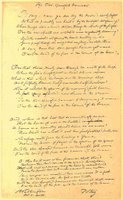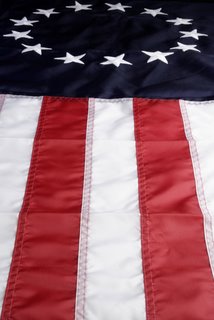There are other patriotic songs in there, such as America the Beautiful, and My Country 'tis of Thee, which is really funny because that song is sung to the tune of God Save the Queen.
So at least the tune of the British national anthem is in there. As is the beautiful Lift Every Voice and Sing by James Weldon Johnson, often considered the "Black national anthem". But not our own American national anthem. At least not any more.
I could make this a rant about what it says about our politically correct society or the decline of patriotism, but I won't. Sadly, much of what I learned about the national anthem I gleaned as a child from the printing of the whole song in the church hymnal. And, not assuming much about the state of civics and history education in America today, allow me to pontificate here on the basis that you, gentle reader, do not know much about our anthem.
 Francis Scott Key, a Washington, DC lawyer, sailed into the Chesapeake Bay to board a British ship with the purpose of securing the release of an acquaintance who had been captured by the British during the War of 1812. The release was secured, but the British would not allow Key to return to Baltimore as an assault was about to begin on Fort McHenry, which defended the harbor. So Key was sent to an American ship where he watched the bombardment of Fort McHenry throughout the day and night of September 13, 1814.
Francis Scott Key, a Washington, DC lawyer, sailed into the Chesapeake Bay to board a British ship with the purpose of securing the release of an acquaintance who had been captured by the British during the War of 1812. The release was secured, but the British would not allow Key to return to Baltimore as an assault was about to begin on Fort McHenry, which defended the harbor. So Key was sent to an American ship where he watched the bombardment of Fort McHenry throughout the day and night of September 13, 1814.At dawn on the 14th, through the haze and early morning sun, Key and his shipmates sought to determine if the fort had fallen by seeing if the American flag was still flying. To their amazement - and pride - the fort had survived the brutal attack, as indicated by the Stars and Stripes billowing above.
Key wrote his observations into a poem called "The Defense of Fort McHenry", and was later put to music in the mid-1800s. It became our national anthem in 1931.
The first verse of his poem has become the words of our national anthem, but so few people ever listen to the words anymore. The first verse is tense and hopeful as evidenced below:
O say can you see, by the dawn's early light,What so proudly we hail'd at the twilight's last gleaming,
It is the morning's first light - is the flag there as it was at sunset last night?
Whose broad stripes and bright stars through the perilous fight O'er the ramparts we watch'd were so gallantly streaming?And the rocket's red glare, the bomb bursting in air,Gave proof through the night that our flag was still there,
We could see the flag during the illuminations of the night-time battle, but...
O say does that star-spangled banner yet wave O'er the land of the free and the home of the brave?
Is it still there? Did we, and what we stand for, survive the battle?
Notice that last sentence - which is often sung triumphantly - is a question! People forget that part.
The second and third verses deal with the details of the battle, but I learned the fourth verse as a child, and it is this verse I think America needs to be reminded of as we stand toe-to-toe with the forces of evil in the war against terror:
O thus be it ever when freemen shall stand Between their lov'd home and the war's desolation!
Blest with vict'ry and peace may the heav'n rescued land Praise the power that hath made and preserv'd us a nation!
Then conquer we must, when our cause it is just,And this be our motto - "In God is our trust,"
And the star-spangled banner in triumph shall wave O'er the land of the free and the home of the brave. (emphasis mine)
That, friends, is what we really should be singing every day.
